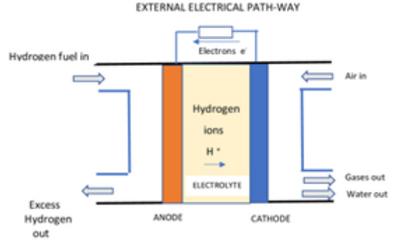
3 minute read
Hydrogen, The Fuel of the Future?
By Ethan White
Introduction
Advertisement
In its gas form, hydrogen is the most abundant element in our universe. Its isotopes are the starting step in the monstrously powerful fusion reactions that power the stars in our sky The hydrogen ‘hype’ has been around for decades now, so why hasn’t it fixed all our energy woes? This complex topic crops up in sustainability conversations constantly, here a succinct overview of the main benefits and limiting factors with the implementation of this group one element as a fuel source will be considered; as well as its existing and potential impacts on wider industry.
Why Hydrogen?
The energy in 1 kilogram of hydrogen gas is about the same as the energy in 1 gallon (2.8 kilograms) of gasoline (US Department of Energy), this alone is a significant factor in its promise as a fuel of the future. Additionally, although elemental hydrogen is not present in great quantities on earth (Lubitz and Tumas 2007) unlike on other planets with more favourable conditions, such as Jupiter, it is stored in many common molecules. These include water and perhaps more importantly, hydrocarbons which we already use for fuel; such as propane or methane. In tandem, these facts display this humble particle in a very favourable light, given the right conditions, transportation methods and infrastructure As it happens however, these constraints are not simple to overcome

Limiting factors
Hydrogen is a colourless, odourless and tasteless gas which is very flammable and explosive, so much so it will spontaneously combust at a broad range of concentrations, even as low as 4% in air (NASA). This possesses a particular issue when safely trying to transport as much of it as possible. Higher concentrations mean more hydrogen molecules per volume of storage space, hence increased transport efficiency. One option to overcome this issue is to store it in its metal form, however an immense amount of energy is required for hydrogen to solidify into this state. This is its de facto form in our solar systems gas giants, but harvesting anything from these celestial bodies is currently pure science fiction.
But lets ignore these ‘small’ feasibility issues and instead take a look at how hydrogen infrastructure has developed over the last few decades. This foundation to build from should be somewhat in place, right? As it appears, large companies have shown limited interest in committing their time, resources and personnel to this so far One factor is that the hydrogen vehicles that have been developed so far are significantly less efficient than electricity in cars, about half as much it turns out (Volkswagen 2019) This fact combined with the issues highlighted in the rolling out of electric charging stations makes the prospect of undertaking another similarly gargantuan infrastructural project hard to swallow for investors.
Consequences
In the face of this adversity, where does hydrogen technology currently stand? Well there is still significant promise buried beneath the surface, the immediate thought may be hydrogen cars and refuelling stations, but other options do exist and have shown great results. The UK is not on target to reach its transport CO2 emissions commitments, change is needed and the transportation sector, accounting for a quarter of transport energy usage (The Royal Society of Chemistry, 2018), may provide the target demographic for hydrogen fuel cell implementation.
These cells use an electrical current to trigger the chemical transformation of hydrogen and air into water and other less common bi-products, whilst releasing energy. These are significantly more suitable for use in the transportation sector since travel is back-to-back, scheduled and therefore more predictable. As a consequence of this, less of the aforementioned refuelling stations would be required, whilst being utilised to a greater extent than they would be for individual travel in cars, for example. These benefits would also apply for similar reasons to certain aspects of public transport such as in fuel cell buses. A case for this technologies’ use in ships, planes and other larger methods of transportation could be made, since these vehicles require greater amounts of energy to function and therefore, benefit to a greater extent from hydrogen’s high energy density as a fuel
Conclusion
In conclusion, although it impossible to say whether or not the hydrogen question will be answered within the near future, its development is certainly slow and steady There are many rabbit holes to dive down in its current and future implementation, such as the ongoing research into increasing storage and transportation energy efficiency, through its inclusion in different stable chemical compounds. One case study that sums up the current situation effectively is that of National Grid’s ‘Future Grid’ project. Much more research and testing is needed and holds a lot of potential upside to UK energy consumers, but is in political limbo with the next general election looming. As we draw closer to climate change deadlines, and sustainability becomes an ever greater consideration in industry, hydrogen as a fuel of the future will only be mentioned more and more.
References
US department of energy. Hydrogen Benefits and Considerations. Hydrogen basics. Alternative fuels data centre. https://afdcenergygov/fuels/hydrogen benefitshtml#:~:text=Hydrogen%20can%20be%20produced%20from,stationary%20and%20transportati on%20energy%20sectors
WolfgangLubitzandWilliamTumas,(2007) Hydrogen:AnOverviewChemicalReviews DOI:101021/cr050200z ACSPublications
NASA. Ask Magazine. Explosive Lessons in Hydrogen Safety. Russel Rhodes. Page 46. Explosive Lessons. https://wwwnasagov/pdf/513855main ASK 41s explosivepdf
Volkswagen (2019) Hydrogen or Battery? A Clear Case, Until Further Notice https://wwwvolkswagenagcom/en/news/stories/2019/08/hydrogen-or-battery--that-is-the-questionhtml
DavidMurray-Smith (2019) AReviewofDevelopmentsinElectricalBattery,FuelCellandEnergyRecoverySystemsforRailwayApplicationsA ReportfortheScottishAssociationforPublicTransport.DOI:10.13140/RG.2.2.16555.67362.
TheRoyalSocietyofChemistry (2018)EnergyandEnvironmentalScience TheRoleofHydrogenandFuelCellsinTheGlobalEnergySystem OtherRoadTransport.DOI:https://doi.org/10.1039/C8EE01157E.










